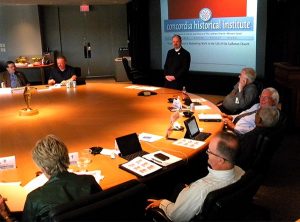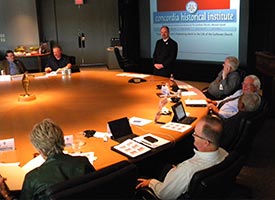By Joe Isenhower Jr. (joe.isenhower@lcms.org)
ST. LOUIS — The Synod’s Board of Directors — during its meeting here Aug. 21-22 — approved a resolution authorizing Concordia Plan Services (CPS) to establish a new corporation to be known as “CPS Ancillary Program Agency.”

CPS, the Synod’s benefits administrator, “continually evaluates the portfolio of products it manages, in response to the growing financial challenges facing the ministries it serves, and the needs of its plan members,” according to a “background” statement for the resolution.
The background statement notes that “supplemental products are within CPS’ responsibilities under the Bylaws of the [Synod], but for legal reasons such products would best be offered through a separate corporation under the authority of the Board of Directors of CPS.”
The CPS board requested authorization from the Synod Board to establish the new agency.
James F. “Jim” Sanft noted that the new agency “will enable CPS to:
- provide an expanded portfolio of quality products and services to meet the needs of ministries and workers.
- utilize current industry distribution systems by obtaining appropriate insurance-agency licensing.
- offset administrative expenses currently borne by the Concordia Plans.”
“The bottom line,” Sanft said when addressing the BOD Aug. 21, [is that] “by being able to create this subsidiary we’re going to enhance the product portfolio that we have in the services available to ministries.”
The Synod Board of Directors also adopted a resolution establishing “regular meetings” of the chief executive officers of Synodwide corporate entities — Concordia Publishing House, Lutheran Church Extension Fund, the LCMS Foundation, Concordia Plan Services and Concordia Historical Institute (CHI) — with the president of the Synod and the LCMS operations team. The Synod’s chief mission officer, chief administrative officer (CAO) and chief financial officer make up the operations team.
Those planned meetings follow individual meetings that LCMS Board Chairman Rev. Dr. Michael Kumm and CAO Ron Schultz held with the board chairs and CEOs of corporate entities in July. Those meetings resulted from discussion among Synod Board members at their August 2014 Board retreat.
The individual July meetings were held to “encourage a mutually beneficial relationship; discuss how together we might enhance our board relationships; [and to] discuss how we can [earlier] identify items that may come before the LCMS Board of Directors for actions, so that the [Board] is better prepared to provide informed assistance,” according to a report that Kumm and Schultz wrote for the August Board meeting.
Their report also noted that “all four meetings were extremely cordial and each participant at the end of the meeting conveyed their appreciation for the openness and collegiality of the conversation.
“There has been good positive feedback from the CEOs and chairs” of the entities meeting in July, Schultz told the Board.
Kumm thanked the Board “for this insight for being able to have the conversations with the leaders of these entities, and for allowing Ron and me to represent you in this manner. We really had some good conversations.”
The “desired outcome” of the upcoming regular meetings “is to share management and program information and strategies so that the organizations’ executive leadership, including [their boards], are vigilant in seeking out opportunities to support the organizations by leveraging resources and minimizing redundant program and operations, where practicable,” as stated in the recommendation to the Board.
The only other action of the Board at its Aug. 21-22 meeting — other than approving its agenda and meeting minutes — was approval of several revisions to Board of Directors audit policies, primarily for clarity.
A considerable portion of the meeting was devoted to several executive sessions.
Reports
In his report to the Board, Synod President Rev. Dr. Matthew C. Harrison wrote that he attended 21 of the 2015 LCMS district conventions and that First Vice-President Rev. Dr. Herbert C. Mueller Jr. was at the remaining 14, with the regional Synod vice-presidents “at nearly all of them.”
“The district conventions were extremely calm and positive across the board,” Harrison told the BOD, which he sees as reflections of “a very positive mood across the Synod. I think it’s a good sign.”
LCMS Chief Financial Officer Jerald C. Wulf and Executive Director of Accounting Ross Stroh reported to the Board that the Synod ended the 2014-15 fiscal year on June 30 in the black.
Synod Secretary Rev. Dr. Raymond L. Hartwig spoke to the Board on a number of matters related to next year’s triennial convention of the Synod — set for July 9-14 in Milwaukee.
Hartwig noted the need for qualified nominees for convention election — particular for the nine boards of regents for the Synod’s Concordia University System colleges and universities. He spoke of a questionnaire that will be sent to those nominated for the regents positions and to other nominees. (For more information, see “LCMS questionnaire mailing could ‘surprise’ nominees.”)
Also reporting to the Board at this meeting were the Rev. Dr. Daniel N. Harmelink, executive director of Concordia Historical Institute (CHI), and LCMS Office of National Mission (ONM) Executive Director Rev. Bart Day.
Harmelink debunked several “myths” about CHI, including that it is “just the Synod’s attic — a storage repository.”
“It’s not just about storage,” he said, but “about faithfully managing the treasures of Lutheranism.”
Responsible for maintaining literally millions of pages of documents, artifacts and other historical items, CHI is the Department of Achives and History for the Synod.
Day told the Board about the work of the ONM, reminding the directors of the Synod’s mission priorities and his office’s primary current focus on one of them — “revitalization of congregations and workers, in collaboration with districts, with the idea that we are going to use the other mission priorities to do revitalization.”
He also shared the ONM mission statement: “That the Office of National Mission will enliven, equip and coordinate and engage districts, congregations, schools, workers and Recognized Service Organizations in order to enhance their local and regional missions and ministries.”
Posted Aug. 27, 2015

